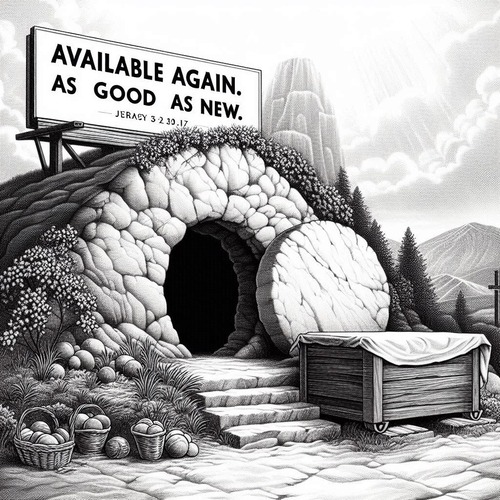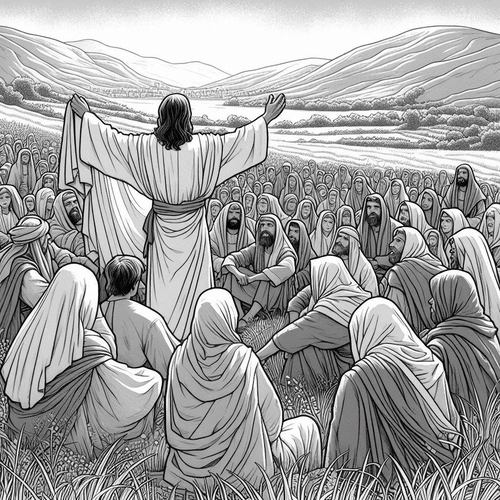Why God Became Man: Could He Have Saved Us Another Way?
Could an all-powerful God have saved humanity without becoming human? It’s a question that strikes at the heart of Christmas and Easter—why did the eternal Son of God need to take on flesh, suffer, and die?
The Incarnation—God becoming man in Jesus Christ—wasn’t an arbitrary divine decision. As John declares, “The Word became flesh and dwelt among us” (John 1:14), and Paul explains Christ “emptied himself, by taking the form of a servant, being born in the likeness of men” (Philippians 2:7). Far from being Plan B, the Incarnation was the necessary and perfect solution to humanity’s greatest problem…
THE PROBLEM THAT REQUIRED THE INCARNATION
Sin created a crisis that demanded divine intervention. Scripture is clear: “All have sinned and fall short of the glory of God” (Romans 3:23). But sin isn’t merely rule-breaking—it’s cosmic treason that separates us from our holy Creator. “Your iniquities have made a separation between you and your God” (Isaiah 59:2).
This separation carries a death sentence. “The wages of sin is death” (Romans 6:23)—not just physical death, but eternal separation from the source of all life and goodness. God’s perfect justice demands payment for this cosmic debt.
Yet humanity stands completely powerless. “None is righteous, no, not one” (Romans 3:10). We’re “dead in trespasses and sins” (Ephesians 2:1), and even “our righteous deeds are like a polluted garment” before God (Isaiah 64:6). No human effort could bridge this infinite chasm between holy God and sinful humanity.
GOD’S ETERNAL PLAN REVEALED
No, the Incarnation wasn’t a divine afterthought—it was God’s plan from eternity, progressively revealed throughout the Old Testament.
Immediately after humanity’s fall, God promised the woman’s offspring would crush the serpent’s head (Genesis 3:15)—the first glimpse of a coming Redeemer who would share our nature yet defeat our enemy. Isaiah prophesied that a virgin would conceive and bear a son called “Immanuel”—God with us (Isaiah 7:14). This child would be called “Mighty God” and “Prince of Peace” (Isaiah 9:6), revealing the stunning truth that our Saviour would be both human and divine.
The suffering servant passages paint the clearest picture: “He was pierced for our transgressions; he was crushed for our iniquities” (Isaiah 53:5). Here we see salvation would require a substitute who could bear our sins.
Old Testament types and shadows consistently pointed to this truth. Abraham’s willingness to sacrifice Isaac prefigured the Father’s sacrifice of His Son (Genesis 22). Every Passover lamb (Exodus 12) and Day of Atonement sacrifice (Leviticus 16) pointed forward to the ultimate spotless sacrifice. The kinsman-redeemer laws required someone who shared the family’s nature to buy back what was lost (Ruth 3-4)—precisely what Christ would do for the human family.
WHY THE INCARNATION WAS THE PERFECT SOLUTION
Only the Incarnation could solve humanity’s impossible predicament because it required someone who was both fully God and fully man.
- As the God-man, Jesus became “the one mediator between God and men” (1 Timothy 2:5). He had to be truly human to represent us, yet truly divine to bear the infinite weight of sin against an infinite God. As our high priest, “he had to be made like his brothers in every respect” so he could “sympathize with our weaknesses” while being “without sin” (Hebrews 4:15).
- The Incarnation enabled the great legal exchange our salvation required. Paul explains Christ was “born under the law, to redeem those who were under the law” (Galatians 4:4-5). As the second Adam, Jesus succeeded where the first Adam failed, undoing the curse through perfect obedience (Romans 5:12-21). God “made him to be sin who knew no sin, so that in him we might become the righteousness of God” (2 Corinthians 5:21).
- This wasn’t merely God overlooking sin, but satisfying His perfect justice while demonstrating His boundless love. God displayed His righteousness “because in his divine forbearance he had passed over former sins” and proved He is “just and the justifier of the one who has faith in Jesus” (Romans 3:25-26).
WHY THE ALTERNATIVES FALL SHORT
Couldn’t God have simply forgiven sin without payment? Such mercy without justice would make God unjust and sin trivial. His holy nature cannot “clear the guilty” without satisfaction (Exodus 34:7).
Couldn’t an angel have served as mediator? Angels are created beings incapable of bearing infinite penalty. As Hebrews explains, Christ “does not help angels but…the offspring of Abraham” (Hebrews 2:16). Only divine nature could satisfy the infinite debt.
What about a sinless human prophet or teacher? All of humanity inherits Adam’s fallen nature (Romans 5:12). Even the best of us “needs daily…to offer sacrifices, first for his own sins and then for those of the people” (Hebrews 7:27). We needed a priest who was “holy, innocent, unstained, separated from sinners” (Hebrews 7:26).
WHY GOD BECAME MAN: THE BEAUTIFUL NECESSITY
The Incarnation reveals God’s love and justice aren’t competing attributes but ones that work in perfect harmony. At the cross, “steadfast love and faithfulness meet; righteousness and peace kiss each other” (Psalm 85:10). Only the God-man could accomplish what no creature could: perfectly satisfy divine justice while demonstrating divine love.
When we grasp this necessity, “The Word became flesh and dwelt among us” transforms from mere historical fact to the most beautiful and necessary truth in existence. The Incarnation wasn’t just the way God chose to save us—it was the only way He could save us while remaining perfectly just and loving.
And that’s why we worship the God who became man.
WHY GOD BECAME MAN: RELATED FAQs
Did God originally plan the Incarnation even without the Fall? This question divides Reformed scholars into two camps: supra- and infra-lapsarianism. Supralapsarians like John Piper argue God decreed the Incarnation first, then permitted the Fall to showcase Christ’s glory. Infralapsarians maintain God decreed to permit sin, then planned the Incarnation as the remedy. Both agree the Incarnation was eternally planned, not reactive.
- Could Jesus have sinned during His earthly ministry? Reformed theology maintains the doctrine of impeccability—Christ could not sin due to His divine nature. Scholars like Wayne Grudem explain that while Jesus faced real temptation in His human nature, His divine nature made actual sinning impossible. This wasn’t a weakness but a strength, ensuring our Saviour’s perfect qualification as substitute. The temptations were real, but failure was impossible.
- Why didn’t God become incarnate as an angel rather than as a human? Angels are created spirits without bodies, while we are embodied souls created in God’s image. Since humanity sinned, a human substitute was required to fulfil the kinsman-redeemer role. As Reformed theologian Louis Berkhof noted, angels cannot represent humanity in our federal relationship with God. Additionally, angels were never promised dominion over creation—a role Christ came to restore to redeemed humanity.
How do Reformed scholars view the “eternal generation” of the Son? Theologians like Fred Sanders and Scott Swain affirm the Son is eternally begotten of the Father—not created or made. This eternal relationship within the Trinity grounds the Son’s unique qualification for Incarnation. The Council of Nicaea’s language remains crucial: the Son is “begotten, not made, being of one substance with the Father,” ensuring both His deity and His distinct personal identity. (CHECK OUT OUR POST: The Eternal Son: How is Jesus Begotten of the Father?)
- Is the Incarnation reversible? Reformed theology consistently affirms the permanence of the Incarnation based on Hebrews 7:24 and Christ’s ongoing mediatorial work. Theologians like Herman Bavinck argued Christ’s human nature wasn’t temporarily assumed but permanently united to His divine nature. The glorified Christ retains His humanity eternally, continuing as our sympathetic High Priest and ensuring the eternal dignity of human nature. (DO READ OUR POST: Meeting Jesus in Glory: Will He Have a Physical Body?)
- How do we address the “kenosis” (emptying) in Philippians 2:7? Contemporary Reformed theologians like Kevin Giles reject the liberal “kenotic theory” that Christ gave up divine attributes. Instead, they argue Christ veiled His glory and voluntarily limited the use of certain divine prerogatives while retaining His full divine nature. The “emptying” was functional, not ontological—Christ added humanity without subtracting divinity. This preserves both His true deity and genuine humanity. (SEE OUR POST: The Kenosis: What Does It Mean that Jesus Emptied Himself?)
Why did God chose this specific method of salvation? While God could theoretically have chosen other means, the Incarnation perfectly displays both His justice and mercy. John Murray argued the cross wasn’t just legally sufficient but morally beautiful, showing God’s hatred of sin and love for sinners simultaneously. Modern scholars like Michael Horton note the Incarnation reveals God’s character most fully—making it not just necessary legally, but fitting theologically and glorifying eternally.
WHY GOD BECAME MAN: OUR RELATED POSTS
Editor's Pick

GPS Without Eyes: How Ants Silently Shout Intelligent Design
Picture a leafcutter ant navigating the rainforest floor in pitch darkness, carrying a leaf fragment 50 times its body weight. [...]

Born Broken: Why Must We Affirm Original Sin?
Imagine a world where we’re born neutral—free to choose good, and without a bias toward evil. Sounds appealing… until we [...]

Does God Truly Care About My Everyday Choices?
OWe believe God created the universe. We believe He orchestrated the exodus from Egypt and raised Jesus from the dead. [...]
SUPPORT US:
Feel the Holy Spirit's gentle nudge to partner with us?
Donate Online:
Account Name: TRUTHS TO DIE FOR FOUNDATION
Account Number: 10243565459
Bank IFSC: IDFB0043391
Bank Name: IDFC FIRST BANK






